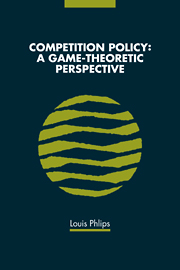9 - Excess capacity and collusion
Published online by Cambridge University Press: 23 September 2009
Summary
The concept of semicollusion
‘Semicollusion’ (or ‘partial collusion’ as it is sometimes called) arises when decisions have to be made in a competitive way but with the understanding that product market collusion will follow, or, alternatively, when collusive decisions are made with the understanding that they will be followed by competition on the product market. Typically, these decisions are about investments. Are the capacities chosen differently if the products resulting from the investment are going to be sold in a collusive way than if the product market is competitive? Conversely, do the independent choices of capacities by individual firms affect the type of collusive agreement these firms will make? Consider the choice of locations for these investments in the space domain or the choice of varieties of differentiated products (which is analytically the same problem: distance is interpreted as a measure of production differentiation). Will the choice of location depend on whether it is followed by collusive rather than competitive pricing? If so, will it in turn affect the collusive prices and profits that are to follow? Consider the choice of investments in R&D. Will these investments be affected by the knowledge that collusion in the product market is going to follow? Will they in turn affect the collusive outcome? What if, to the contrary, R&D is organised in a collusive way but followed by competition in the product market?
Clearly, these examples raise questions of considerable interest.
- Type
- Chapter
- Information
- Competition PolicyA Game-Theoretic Perspective, pp. 151 - 172Publisher: Cambridge University PressPrint publication year: 1995



